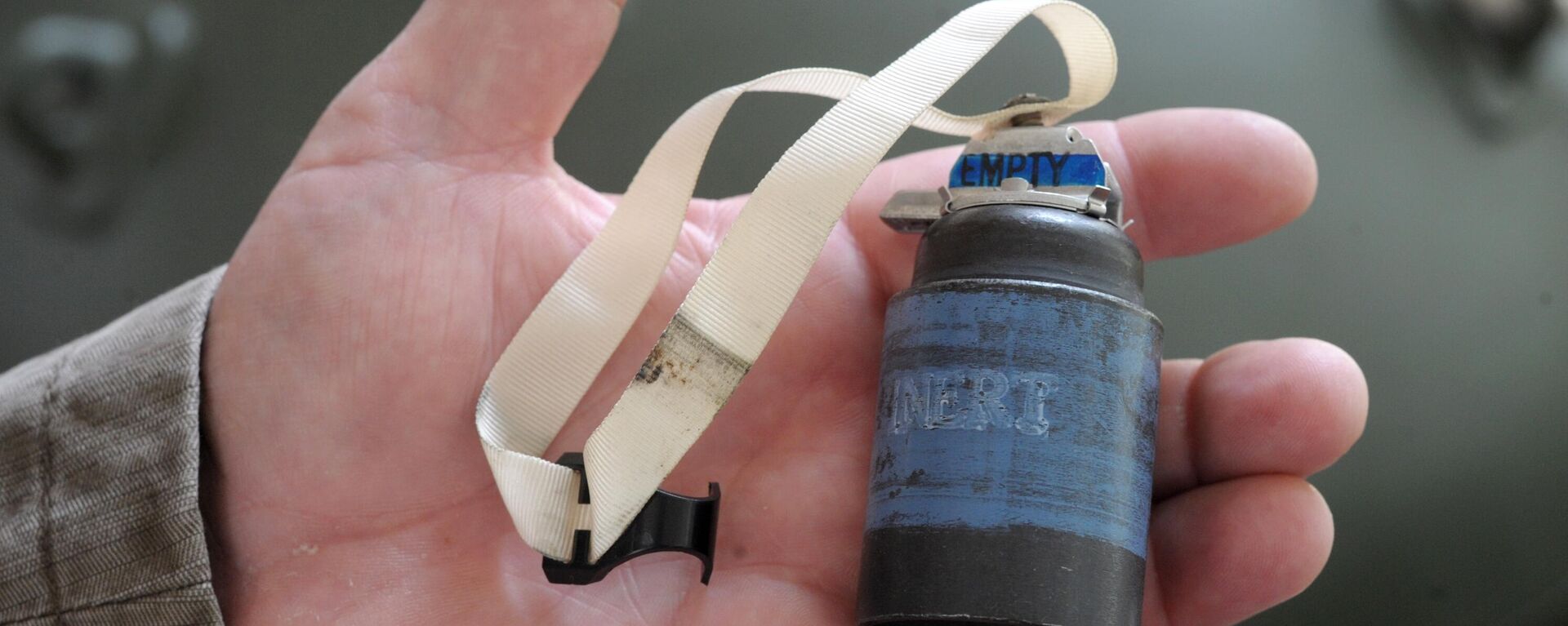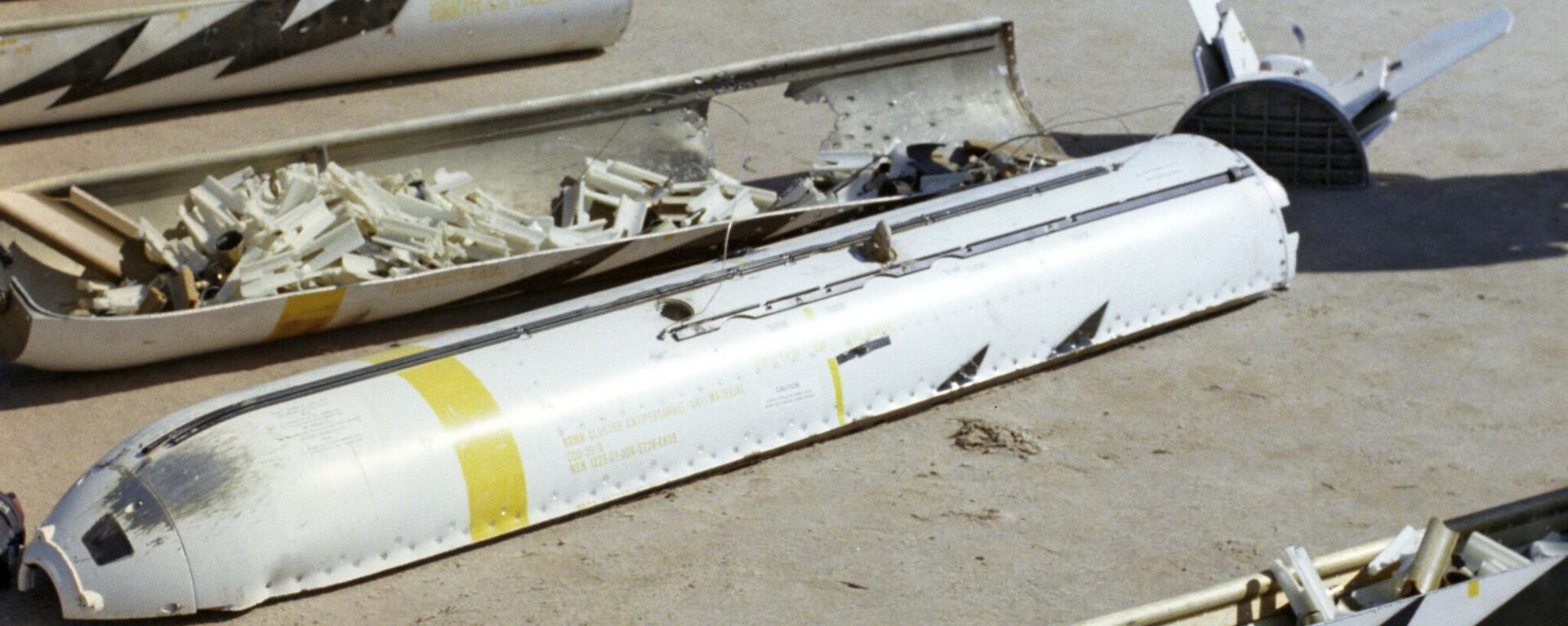https://sputnikglobe.com/20230708/kievs-promise-not-to-use-cluster-bombs-against-civilians-is-meaningless-heres-why-1111757453.html
Kiev’s Promise Not to Use Cluster Bombs Against Civilians is Meaningless: Here’s Why
Kiev’s Promise Not to Use Cluster Bombs Against Civilians is Meaningless: Here’s Why
Sputnik International
Multiple US allies, human rights and anti-war groups, the UN and Moscow have condemned Washington’s decision to send howitzer-launched DPICM cluster bombs to... 08.07.2023, Sputnik International
2023-07-08T19:20+0000
2023-07-08T19:20+0000
2023-07-08T19:44+0000
kiev
ukraine
russia
scott bennett
andrei koshkin
nato
the united nations (un)
military
https://cdn1.img.sputnikglobe.com/img/07e6/0c/15/1105680293_0:161:3071:1888_1920x0_80_0_0_f6a941a13a85b2239183c64032d44a45.jpg
“The Ukrainian government has offered us assurances in writing on the responsible use of DPICMs, including that they will not use the rounds in civilian populated urban environments, and that they will record where they use these rounds, which will simplify later demining efforts,” under secretary of defense Colin Kahl said in a briefing Friday announcing the US decision to send cluster munitions to Kiev.The Pentagon official assured that as “with every system” that Washington has already provided to Kiev to date, Ukrainian troops will be getting “coaching and mentoring” from the US associated with the use of cluster bombs.Ukrainian Defense Minister Oleksii Reznikov echoed Kahl’s assurances in a long tweet Saturday in which he “welcomed” the US move to provide Kiev with “new liberation weapons."Reznikov promised that Kiev would not use the cluster munitions against “the officially recognized territory of Russia,” nor urban areas, so as “to avoid the risks for the civilian populations.”Empty Promises“One can write about one’s intention not to use these weapons against civilians in any documents. But in practice, the conduct of military operations in Ukraine shows that the Ukrainian Armed Forces stop at nothing,” Dr. Koshkin said, pointing out that Kiev has already been condemned by the United Nations for using air-dropped Lepestok anti-personnel mines, for example.A cursory analysis of recent media reports confirms Koshkin’s point, starting with the long history of Ukraine’s terror shelling of Donbass cities and civilian infrastructure in Crimea using NATO caliber artillery and long-range missile systems, and topping off with HIMARS rocket and drone attacks against Russian regions including Belgorod and Voronezh.The Joint Center for Control and Coordination, a Donbass-based watchdog set up in 2014 to monitor violations of the Minsk agreements, reported this past May that over 4,500 civilians have been killed and more than 4,400 wounded in Ukrainian shelling over the past year, with 3,791 of the fatalities recorded in newly liberated territories of the Donbass.Stalled CounteroffensiveKoshkin is confident that the timing of the US decision to send cluster munitions to Ukraine has everything to do with the stalling of Ukraine’s summer counteroffensive, which he pointed out failed to break through Russian defensive lines at terrible cost to Kiev.Under secretary Kahl confirmed in his press briefing Friday that the US is hoping to deliver the cluster munitions to Ukraine “in a timeframe that is relevant for the counteroffensive.” Kahl also assured that “the Ukrainians have a lot of combat power left,” and that “in fact, the majority of their combat power for this fight has not been brought to bear.”Who Will Pay the Piper?Asked whether Washington would accept any responsibility if and when Kiev decides to use its US-provided cluster bombs in civilian areas, as it already has with other NATO-provided weapons, Koshkin said recent history strongly suggests it won’t.As for statements by US allies including Canada, Britain, Spain and Germany condemning Washington’s decision to send its cluster munitions to Kiev, the academic said there’s a clear tendency for Washington to simply ignore them, especially since formal condemnation is never followed up by any sort of real action.‘Pandora’s Box’Scott Bennett, a former US Army psychological warfare officer and State Department counterterrorism analyst, told Sputnik that the introduction of cluster bombs in Ukraine “will be the equivalent of opening Pandora’s box,” and that its results will be “nothing but violent indiscriminate civilian deaths, destruction of property, [and] the haunting nightmares of children’s screams.”Bomblets May Quickly Spread to Russia, EuropeThe observer couldn’t rule out Kiev disassembling the cluster bombs, and attempting to smuggle them into Russia to distribute across major cities. Furthermore, given Kiev’s generally shoddy record of keeping track of its NATO-provided weapons, Bennett said the bomblets could be spread by terrorist groups and begin to be spotted being “rolled down French, German and British streets by rioters and protesters and hooligans like bowling balls and explod[ing] into police stations, churches and government buildings.”The counterterrorism analyst has personal experience with cluster bombs, recalling that during his tour in Iraq, US troops would “see the small spherical bomblets that come out of the cluster bombs littering the ground like softball-sized silver pearls, and Iraqi children, with their bright white smiles and tan faces and tasseled black hair, playing games with them, and laughing as they kicked them around like soccer balls, oblivious to the earth-shattering explosions that would soon follow when they accidentally detonated them.”‘Test of Authenticity’Commenting on the surprise criticism from senior lawmakers in President Biden’s own party which the White House has received in the wake of the cluster munitions for Ukraine announcement, Bennett emphasized that “heartfelt objections” aside, “the real test of authenticity is whether the US Congress will pass legislation forbidding their use.” Anything less will only serve to “confirm that the Congress is all talk but no action,” in his view.Bennett also echoed Dr. Koshkin’s assessment regarding Kiev’s promises not to use cluster munitions against civilians, saying any “promises, treaties or other pseudo-guarantees” are little more than a “deception operation intended to win the trust and lower the defenses of Russia and its allies.”Not Much of a SurpriseThere’s nothing surprising about the fact that “the nation which set the precedent in the use of nuclear weapons at the end of World War II decided to transfer cluster munitions to Kiev, despite statements to media beforehand that it was not going to do this,” Imelda Ibanez, a researcher at the Eurasia Study Group at the National Autonomous University of Mexico, told Sputnik Mundo.“The United States has always resorted to double standards, talking about having the tools to fight for freedom and democracy, while blatantly interfering in the affairs of sovereign states. We have well-known examples: Iraq, Libya, Syria and obviously, Yugoslavia,” Ibanez said.
https://sputnikglobe.com/20230404/cool-head--nerves-of-steel-how-donbass-sappers-clear-deadly-mines-laid-by-ukraine-1109111714.html
https://sputnikglobe.com/20230708/scott-ritter-cluster-munitions-will-change-nothing-for-ukraine-1111754159.html
https://sputnikglobe.com/20230708/bidens-cluster-munitions-transfer-to-ukraine-ripped-as-terrible-mistake-by-top-dems-1111741232.html
kiev
ukraine
russia
Sputnik International
feedback@sputniknews.com
+74956456601
MIA „Rossiya Segodnya“
2023
News
en_EN
Sputnik International
feedback@sputniknews.com
+74956456601
MIA „Rossiya Segodnya“
Sputnik International
feedback@sputniknews.com
+74956456601
MIA „Rossiya Segodnya“
ukraine, russia, cluster bomb, cluster munition
ukraine, russia, cluster bomb, cluster munition
Kiev’s Promise Not to Use Cluster Bombs Against Civilians is Meaningless: Here’s Why
19:20 GMT 08.07.2023 (Updated: 19:44 GMT 08.07.2023) Multiple US allies, human rights and anti-war groups, the UN and Moscow have condemned Washington’s decision to send howitzer-launched DPICM cluster bombs to Ukraine. Kiev have promised not to use the weapons against civilians, but Kiev’s record using the NATO weapons it has already speaks for itself, experts told Sputnik.
“The Ukrainian government has offered us assurances in writing on the responsible use of DPICMs, including that they will not use the rounds in civilian populated urban environments, and that they will record where they use these rounds, which will simplify later demining efforts,” under secretary of defense Colin Kahl
said in a briefing Friday announcing the US decision to send cluster munitions to Kiev.
“We will, of course, be watching how the Ukrainians use these systems. They will be reporting their usage back to us, and so we can always make judgements later if we feel like those assurances are not being met. But I’m confident that the Ukrainians will be true to their word,” Kahl added.
The Pentagon official assured that as “with every system” that Washington has already provided to Kiev to date, Ukrainian troops will be getting “coaching and mentoring” from the US associated with the use of cluster bombs.
Ukrainian Defense Minister Oleksii Reznikov echoed Kahl’s assurances in a long tweet Saturday in which he
“welcomed” the US move to provide Kiev with “new liberation weapons."
Reznikov promised that Kiev would not use the cluster munitions against “the officially recognized territory of Russia,” nor urban areas, so as “to avoid the risks for the civilian populations.”
“It’s ridiculous how many times we’ve now heard such ‘assurances’ and ‘security guarantees,’” Andrei Koshkin, a veteran Russian academic specializing in military and international affairs issues, told Sputnik.
“One can write about one’s intention not to use these weapons against civilians in any documents. But in practice, the conduct of military operations in Ukraine shows that the Ukrainian Armed Forces stop at nothing,” Dr. Koshkin said, pointing out that Kiev has already been condemned by the United Nations for using air-dropped Lepestok anti-personnel mines, for example.
“They won’t be held back by any civilians. They’ll use everything they’ve got to the fullest, without even thinking about the consequences to their own population,” the academic stressed.
A cursory analysis of recent media reports confirms Koshkin’s point, starting with the long history of Ukraine’s
terror shelling of Donbass cities and civilian infrastructure in Crimea using NATO caliber artillery and
long-range missile systems, and topping off with HIMARS rocket and drone attacks against Russian regions including Belgorod and Voronezh.
The Joint Center for Control and Coordination, a Donbass-based watchdog set up in 2014 to monitor violations of the Minsk agreements, reported this past May that over 4,500 civilians have been killed and more than 4,400 wounded in Ukrainian shelling over the past year, with 3,791 of the fatalities recorded in newly liberated territories of the Donbass.
Koshkin is confident that the timing of the US decision to send cluster munitions to Ukraine has everything to do with the stalling of Ukraine’s
summer counteroffensive, which he pointed out failed to break through Russian defensive lines at terrible cost to Kiev.
Under secretary Kahl confirmed in his press briefing Friday that the US is hoping to deliver the cluster munitions to Ukraine “in a timeframe that is relevant for the counteroffensive.” Kahl also assured that “the Ukrainians have a lot of combat power left,” and that “in fact, the majority of their combat power for this fight has not been brought to bear.”
Asked whether Washington would accept any responsibility if and when Kiev decides to use its US-provided cluster bombs in civilian areas, as it already has with other NATO-provided weapons, Koshkin said recent history strongly suggests it won’t.
“They used cluster munitions in Iraq, Vietnam and Afghanistan and did not accept any responsibility. Deliveries of these weapons to Ukraine are of no interest to them at all,” the academic stressed. On the contrary, Koshkin noted, it’s very convenient for the US to be able to dump this dangerous and unreliable class of munitions on Ukraine, after which the Pentagon can simply write them off.
As for statements by US allies including Canada, Britain, Spain and Germany
condemning Washington’s decision to send its cluster munitions to Kiev, the academic said there’s a clear tendency for Washington to simply ignore them, especially since formal condemnation is never followed up by any sort of real action.
Scott Bennett, a former US Army psychological warfare officer and State Department counterterrorism analyst, told Sputnik that the introduction of cluster bombs in Ukraine “will be the equivalent of opening Pandora’s box,” and that its results will be “nothing but violent indiscriminate civilian deaths, destruction of property, [and] the haunting nightmares of children’s screams.”
“The supreme danger of the cluster bombs the US is intending on sending to Ukraine is that they are 20 years old, which means they will have a very high ‘dud’ rate - probably 10-20 percent or more. This means these bomblets will be left unexploded all over the landscape waiting for unsuspecting civilians to detonate them – which seems to be the objective: terror,” Bennett explained.
Bomblets May Quickly Spread to Russia, Europe
The observer couldn’t rule out Kiev disassembling the cluster bombs, and attempting to smuggle them into Russia to distribute across major cities. Furthermore, given Kiev’s
generally shoddy record of keeping track of its NATO-provided weapons, Bennett said the bomblets could be spread by terrorist groups and begin to be spotted being “rolled down French, German and British streets by rioters and protesters and hooligans like bowling balls and explod[ing] into police stations, churches and government buildings.”
Bennett pointed out that as a low intensity weapon, the bomblets could be disassembled and used as smaller explosive devices in urban warfare, or rigged to detonate remotely using a cellphone. “They do not possess the easily detectable substances that bomb-sniffing dogs can detect. So although they may appear on the battlefield, the battles they will be used in will be future domestic terror operations,” the expert warned.
The counterterrorism analyst has personal experience with cluster bombs, recalling that during his tour in Iraq, US troops would “see the small spherical bomblets that come out of the cluster bombs littering the ground like softball-sized silver pearls, and Iraqi children, with their bright white smiles and tan faces and tasseled black hair, playing games with them, and laughing as they kicked them around like soccer balls, oblivious to the earth-shattering explosions that would soon follow when they accidentally detonated them.”
“It is the memory of what these bombs did to children in Iraq that most horrifies and outrages me about what they will inevitably do to the children in Ukraine, Russia, and Europe as they find their way into civilian areas. And make no mistake, that is the plan, and terrorism the objective, and no country is more skilled at terrorism than the United States, sadly,” Bennett stressed.
Commenting on the
surprise criticism from senior lawmakers in President Biden’s own party which the White House has received in the wake of the cluster munitions for Ukraine announcement, Bennett emphasized that “heartfelt objections” aside, “the real test of authenticity is whether the US Congress will pass legislation forbidding their use.”
Anything less will only serve to “confirm that the Congress is all talk but no action,” in his view.
Bennett also echoed Dr. Koshkin’s assessment regarding Kiev’s promises not to use cluster munitions against civilians, saying any “promises, treaties or other pseudo-guarantees” are little more than a “deception operation intended to win the trust and lower the defenses of Russia and its allies.”
There’s nothing surprising about the fact that “the nation which set the precedent in the use of nuclear weapons at the end of World War II decided to transfer cluster munitions to Kiev, despite statements to media beforehand that it was not going to do this,”
Imelda Ibanez, a researcher at the Eurasia Study Group at the National Autonomous University of Mexico, told
Sputnik Mundo.
“The United States has always resorted to double standards, talking about having the tools to fight for freedom and democracy, while blatantly interfering in the affairs of sovereign states. We have well-known examples: Iraq, Libya, Syria and obviously, Yugoslavia,” Ibanez said.
Ibanez characterized Friday’s decision on cluster munitions as “extremely dangerous,” and said that the Zelensky government’s apparent willingness to use these borderline "unconventional weapons" demonstrates Kiev's “absolute disregard for the norms of international humanitarian law.”





